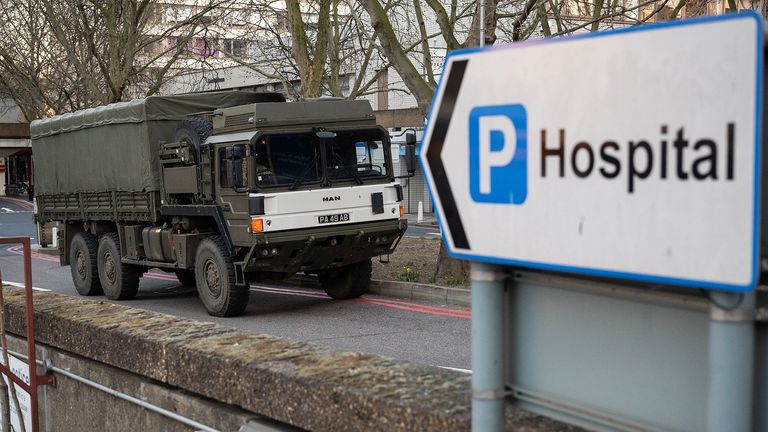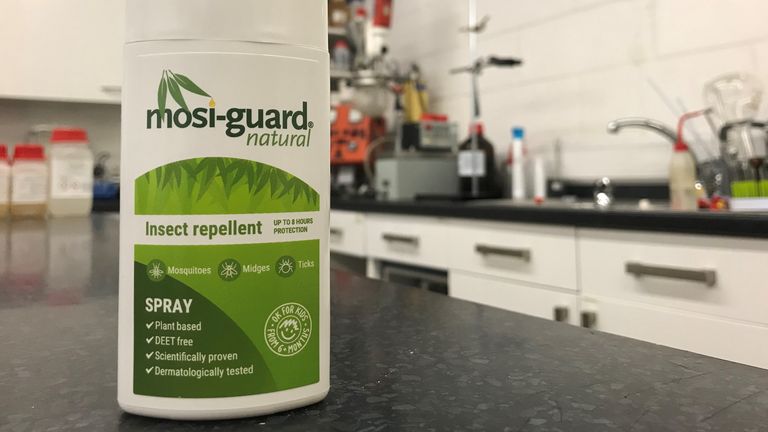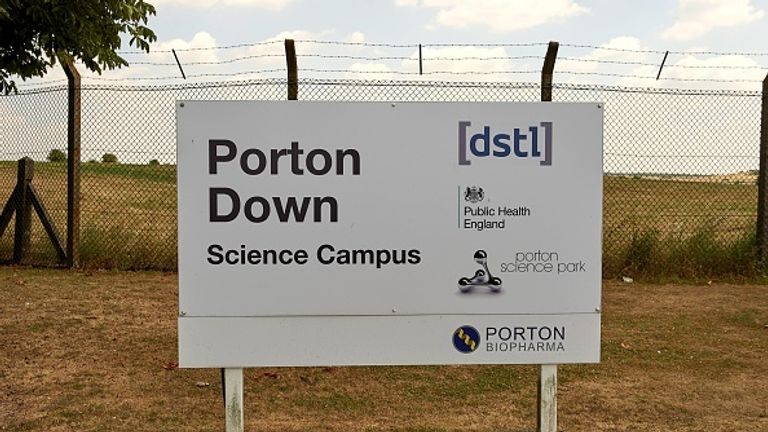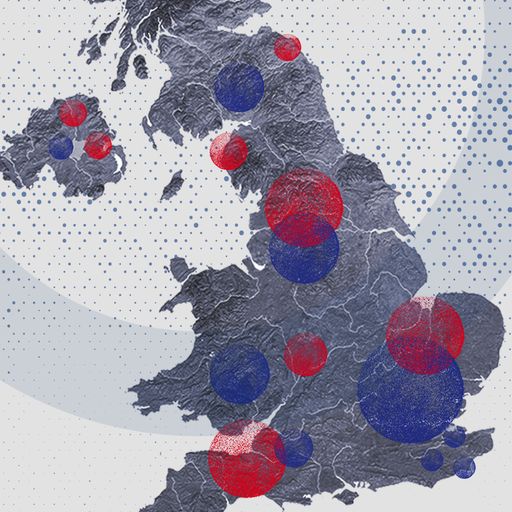Coronavirus: Insect repellent to be tested by MoD lab to see if it kills COVID-19
Some soldiers have already being given a repellent containing the product as part of "enhanced" health measures.
Wednesday 29 April 2020 08:04, UK
Britain's defence laboratory will test whether a product found in insect repellent can also be used to kill the strain of coronavirus that causes COVID-19, Sky News has learned.
Citriodiol is known to be effective at destroying certain types of coronavirus, so the Ministry of Defence (MoD) is exploring its use against the strain behind the COVID-19 pandemic.
Scientists at the Defence Science and Technology Laboratory (DSTL) at Porton Down have been asked to conduct studies to provide further evidence, a spokesperson said.
"Further work is required to determine its full effectiveness, acquisition and distribution," the MoD spokesperson added.
Sky News revealed last week that some soldiers are already being issued with Mosi Guard, a type of insect repellent that contains citriodiol, as part of "enhanced force health protection measures" during the crisis.
Priority will be given to personnel who are involved in operational roles and troops who are supporting the government's effort to tackle coronavirus, according to military sources.
Use is optional, not obligatory, and the spray would be in addition to social distancing, handwashing and wearing personal protective equipment.
The Ministry of Defence said there has been no widespread rollout.
"Citriodiol is known to have anti-viral properties and has been used as a barrier against the SARS 1 virus," the spokesperson said, referring to the strain that caused the 2003 epidemic.
"Its utility for protecting against COVID-19 is therefore being explored by the Ministry of Defence as an additional protective measure for personnel working on the response."
The issuing of insect repellent has triggered curiosity among MPs.
Two opposition defence spokespeople and the chair of the Defence Select Committee have written separately to Defence Secretary Ben Wallace to request further details.
Stewart McDonald of the Scottish National Party has asked to see the evidence the MoD relied upon to start issuing the insect repellent.
According to a copy of his letter, he said: "If this is based on science, it is vital that the evidence is made public and all frontline workers are given the same advice.
"If there is no evidence that it will be effective, then the MoD must explain why this product is being issued, creating a false sense of security and putting lives at risk.
"Clarity on this matter is of the greatest urgency."
Jamie Stone of the Liberal Democrats said that transparency was vital.
According to a copy of his letter, he wrote: "The over-riding point is that if your decision has been taken on the basis of sound scientific evidence, then why are other frontline workers not also being provided with citriodiol?"
The MP has also submitted a formal question to the Ministry of Defence, asking for the evidence to be made public. The department must reply by 4 May.
John Healey, Labour's shadow defence secretary, is understood to have submitted a question to the MoD about the use of citriodiol as well.
In his letter, Tobias Ellwood, a senior Conservative MP and chair of the Defence Select Committee, asked the defence secretary to confirm troops had been issued with insect repellent and, if so, how many.
He also asked whether DSTL was involved in any testing of the product.
The former defence minister added: "Are there plans to issue citriodiol to other essential workers, such as those in the NHS?"
:: Listen to the Daily podcast on Apple Podcasts, Google Podcasts, Spotify, Spreaker
Citrefine International Ltd, the company that makes citriodiol, welcomed the news that defence scientists would be testing the product.
Citriodiol stays on the skin for several hours, meaning it could provide a longer period of protection than soap and water if proven to be an effective barrier, according to Jacqueline Watson, managing director of the small, Leeds-based firm.
She said the company had been calling for government support for a testing programme.
"I can understand why people are sceptical," Ms Watson told Sky News in an interview.
"They are right we don't have data against this particular virus.
"However there is data against other coronaviruses. And, I am certainly not an expert in this area, but having talked to experts, there is good reason to think it may well work against this. But that is why it is just so important to get it tested really thoroughly at a specialist laboratory."
She described how citriodiol had been proven to breakdown the envelope around other coronaviruses, killing the disease.
The product would not guard against inhalation but could kill the virus on a person's skin before it could be transferred anywhere else.
If its utility against the pandemic is proven, Ms Watson said her company would like to work with the government on how best it could be deployed.
"It is not necessarily going to utilised across the country - in homes, for example - but it could well be used on the front line or as people start to be able to go out and about," she said.
Citriodiol is made from oil from the leaves and twigs of the eucalyptus citriodora tree, which is found in Asia, South America and Africa.
It is used in the insect repellent Mosi Guard and others.
It is understood that only insect repellent containing citriodiol and not containing deet is regarded as having the potential of any kind of utility against the novel coronavirus.







